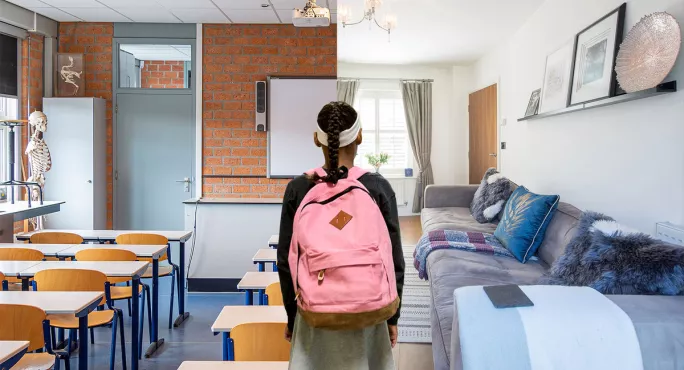Attendance: Thousands of pupils on part-time timetables

Up to 34,000 children could be attending school on part-time timetables, an analysis of national attendance data suggests.
The research also suggests that - taking into account pupils in forms of alternative provision - there could be more than 100,000 pupils in state-funded education for whom a full-time timetable in mainstream or special schools is deemed unsuitable.
The analysis by FFT Education Datalab, which looked at pupils’ patterns of absence in attendance records, comes after Ofsted’s annual report in December suggested part-time timetables were being used “too often” by schools that were unable to manage a child’s additional needs or behaviour.
Some schools, Ofsted said, had told inspectors that they see part-time timetables as an alternative to having to carry out an exclusion. Inspections also found that children and young people with special educational needs or disabilities are more likely to be placed on a part-time schedule.
Dave Thompson, chief statistician at FFT Education DataLab, said the new analysis was the first time anybody had tried to calculate the number of children on part-time timetables by looking at schools’ use of the “C” code for “authorised leave of absence”.
- Ofsted: Warning over schools using part-time timetables
- Inquiry: MPs committee hears concerns over schools misuse of attendance code
- Exclusive: DfE concern over off-site schooling
In a new blog highlighting the findings, Mr Thompson said there is no specific absence code to record pupils on a “part-time timetable”, but that many authorities advise the use of the “C” code for school sessions pupils are not expected to attend.
He said that researchers took data from 10,000 schools in England using the FFT Attendance Tracker covering the first two terms of the 2022-23 academic year.
They looked at pupils who were “repeatedly absent with Code C” and pinpointed those who were absent for at least one or two days in four different weeks over a continuous six-week period.
In the blog, Mr Thompson said that rates were highest among Year 11 pupils at 1 per cent of pupils, similar to rates for the controversial “Code B” - used for when pupils are being educated off-site.
Among primary-aged pupils, those in Reception were most likely to show a pattern consistent with being on a part-time timetable.
He added: “In total, grossing the figures up to the national population, we would estimate that around 34,000 pupils nationally could have had a part-time timetable in which they were absent from school for at least a day a week up to the end of the spring term in 2022-23.
“Of these, 18,000 could have had a part-time timetable in which they were absent for at least two days a week.”
Combined with Department for Education figures on pupils in state-funded alternative provision and those funded to attend provision outside the state sector, the analysis concluded that there could be “100,000 pupils in state-funded education for whom full-time education in mainstream or special schools is not considered suitable or appropriate”.
But Mr Thompson added a note of caution, he said in the blog: “We assume that these pupils are attending part-time but, clearly, we cannot know this for sure.
“Nor do we know why pupils might be attending part-time. Is it due to a behaviour intervention? Or could they be being homeschooled the rest of the time (what is known as flexi-schooling)? Or even some other reason?”
He confirmed that pupils with education, health and care plans were “over-represented in the group who exhibit the pattern of a part-time timetable”.
Mr Thompson told Tes he wanted the analysis to act as a “starting point” to the discussion.
He said: “We expect people to react and contribute to the discussion. We’re interested in other circumstances beyond part-time timetables where pupils might be off regularly with an authorised leave of absence.”
Reacting to the findings, Julie McCulloch, director of policy at the Association of School and College Leaders, said that part-time timetables could be “helpful in some circumstances in aiding a pupil’s return to education full-time”.
But she stressed that although schools were doing all they could to improve attendance, the support needed was “sorely lacking”.
She said: “Budget constraints mean it is challenging to provide the pastoral and specialist support required to help some pupils attend more regularly.
“At the same time, there are long waiting times for children’s mental health services and attendance support services provided by local authorities have been decimated by central government cuts.
“Extra funding must be made available to help schools reduce absences and ensure no child unnecessarily misses out on crucial learning and development.”
You need a Tes subscription to read this article
Subscribe now to read this article and get other subscriber-only content:
- Unlimited access to all Tes magazine content
- Exclusive subscriber-only stories
- Award-winning email newsletters
Already a subscriber? Log in
You need a subscription to read this article
Subscribe now to read this article and get other subscriber-only content, including:
- Unlimited access to all Tes magazine content
- Exclusive subscriber-only stories
- Award-winning email newsletters



